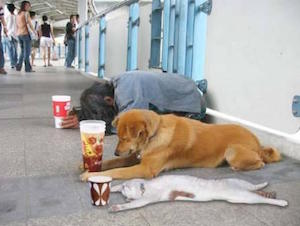“I suspect that the mind, like the feet, works at about three miles an hour. If this is so, then modern life is moving faster than the speed of thought, or thoughtfulness.”
 “Of all ridiculous things,”Kierkegaard wrote in contemplating our greatest source of unhappiness, “the most ridiculous seems to me, to be busy — to be a man who is brisk about his food and his work.” Just a few years later, on the other side of the Atlantic, another sage of the ages considered a particularly perilous form of briskness — in 1861, Thoreau penned histimeless treatise on walking and the spirit of sauntering. Half a century later, Swiss modernist writer Robert Walser captured this spirit in his short story “The Walk,” which includes this exquisite line: “With the utmost love and attention the man who walks must study and observe every smallest living thing, be it a child, a dog, a fly, a butterfly, a sparrow, a worm, a flower, a man, a house, a tree, a hedge, a snail, a mouse, a cloud, a hill, a leaf, or no more than a poor discarded scrap of paper on which, perhaps, a dear good child at school has written his first clumsy letters.”
“Of all ridiculous things,”Kierkegaard wrote in contemplating our greatest source of unhappiness, “the most ridiculous seems to me, to be busy — to be a man who is brisk about his food and his work.” Just a few years later, on the other side of the Atlantic, another sage of the ages considered a particularly perilous form of briskness — in 1861, Thoreau penned histimeless treatise on walking and the spirit of sauntering. Half a century later, Swiss modernist writer Robert Walser captured this spirit in his short story “The Walk,” which includes this exquisite line: “With the utmost love and attention the man who walks must study and observe every smallest living thing, be it a child, a dog, a fly, a butterfly, a sparrow, a worm, a flower, a man, a house, a tree, a hedge, a snail, a mouse, a cloud, a hill, a leaf, or no more than a poor discarded scrap of paper on which, perhaps, a dear good child at school has written his first clumsy letters.”
It
might be every professor’s worst nightmare: losing control of a class with no
hope of getting it back on track. That appears to be what
happened this semester at Texas A&M University at Galveston, where a
management instructor threatened to fail the entire class for poor behavior
before the university intervened. The professor described a class full of
students who wouldn't do the work, who weren't performing according to his
expectations and who were consistently rude to him.
Viewpoint: Why do people waste so much time at the office? BBC
Smile
at the customer. Bake cookies for your colleagues. Sing your subordinates’
praises. Share credit. Listen. Empathize. Don’t drive the last dollar out of a
deal. Leave the last doughnut for someone else.
Sneer
at the customer. Keep your colleagues on edge. Claim credit. Speak first. Put
your feet on the table. Withhold approval. Instill fear. Interrupt. Ask for
more. And by all means, take that last doughnut. You deserve it.
More recently, books like The Power of Nice and The Upside of Your Dark Side have continued in the
same vein: long on certainty, short on proof
Labor’s Enemies Wear Black Robes, Not White Hoods Counterpunch
Free-market dogma has jacked up our electricity bills David Cay Johnston,
Bank of England Accidentally E-mails Brexit Plans to The Guardian Bloomberg
The rise of non-standard work undermines growth and increases inequality Bill Mitchell
Public-Sector Jobs Vanish, Hitting Blacks Hard New York Times
Why It Pays to Be a Jerk Atlantic
GM inquiry Is said to find criminal fault CNBC. Faulty ignitions.
How Employers Get Out of Paying Their Workers Priceonomics
These states rob from the poor and give to the rich WaPo
In These 21 Countries, a 40-Hour Work Week Still Keeps Families in Poverty Bloomberg
House of Secrets The New Yorker
A voice for the voiceless McGill News. Interview with François Crépeau, United Nations Special Rapporteur on the Human Rights of Migrants.
Four Ways in Which the World Has Surprised Me Over the Past Decade with Its Economics Brad DeLong, Washington Center for Equitable Growth
Minimum wages: Pay dirt Economist
‘Prisonized’ neighborhoods make ex-cons more likely to return to the slammer Science
churches and slavery — 5/22/15 delanceyplace
John Smith writes:
http://mentalfloss.com/article/58515/why-colonel-spelled-way
“Colonel” is pronounced just like “kernel.” How did this happen? From borrowing the same word from two different places. In the 1500s, English borrowed a bunch of military vocabulary from French, words like cavalerie, infanterie, citadelle, canon, and also, coronel. The French had borrowed them from the Italians, then the reigning experts in the art of war, but in doing so, had changed colonello to coronel
